All men are equal before fish ~ Herbert Hoover
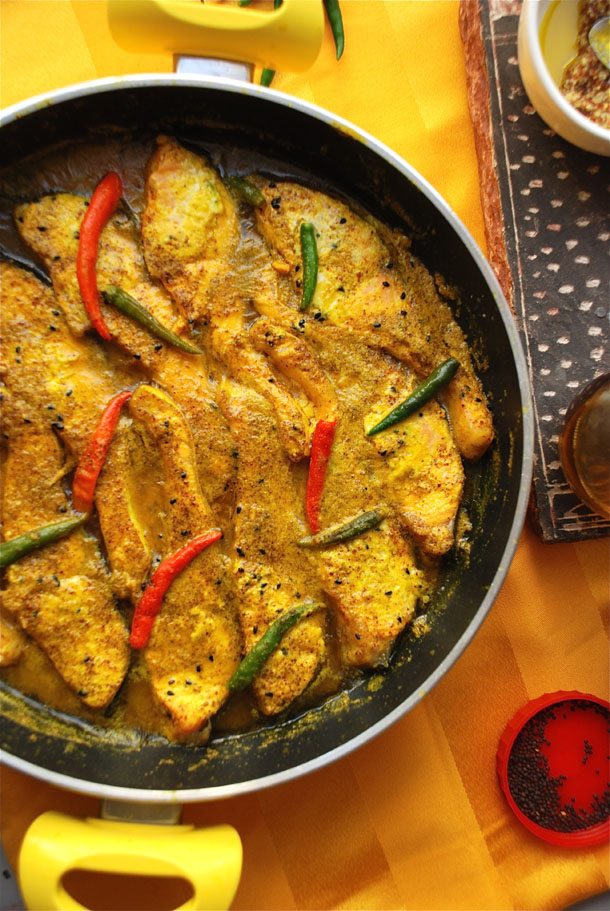
This post probably should have happened a long time ago. The Shorshe Bata Maach or the Bengali Mustard Fish is the most sought after dish in a Bengali’s life (sounds cliched? But its as cliched as taking a Kolkata selfie with Howrah Bridge at the backdrop – or as inevitable as having the Eiffel Tower in Paris). It is also the most searched term in my blog. A Bengali blogger at the end of the day has to blog on Maach/Fish, Shorshe Bata/Mustard Paste and Rôshogolla/Rasgulla. On Rôshogolla, I already have. On Shorshe Bata, I haven’t. I have been feeling a bit nervous lately with the invisible ostracisation (from the Bengali community) notice hanging over my head. So, I take the opportunity of the Noboborsho, first day of the Bengali New Year, to write my long overdue post on Shorshe Bata Maach. This is a slight detour on my blogging atlas – I’ve been hovering in Thailand lately with my last few posts being:
• Koh Klang in Krabi, Thailand | A Photo Essay of An Island Life
• Ruen Mai Restaurant In Krabi | A Tantalising First Experience Of Thai Food {In Thailand, That is!}
Before I write my third post on the Fishermen’s village in Thailand and the floating restaurant where I paid another visit to learn Thai cooking from Bao, the cook at the restaurant and before I share more fish recipes… I thought my Bengali Macher post has to come through! [Updating in March 2018… by this time there’s also a fishy post by the name of A-Z of Bengali Fish]
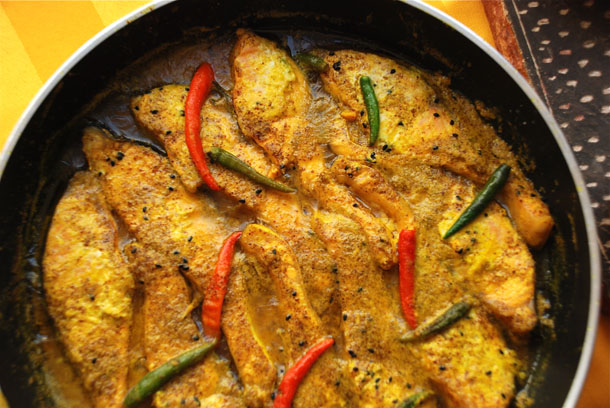
I have tick marked all the right check boxes to prove my Bengali genes by writing an ode to Luchi in the lifestyle Gourmet magazine {Luchi Featured In Ahlan! Gourmet | My Ode To Phulko Luchi!}, Mishti Doi in BBC GoodFood Middle East {Bhapa Mishti Doi and A Food Safari of Bengal }, I have even made Rôshogolla for the local television channel Dubai One for a special episode on Ramadan {Rasgulla Macapuno On TV & Shubho Bijoya to all!} and prepared the Bengali Aam Pana for another channel {UAE National Day… Aam Pana | My Dubai My City}, Rôshogolla in {Rôshogolla (রসগোল্লা) | Bengali’s Own Sweet} and some more sweets {Bengali Sweets That Came By Parcel!} … I still feel incomplete because I haven’t written on Shorshe Bata Maach!
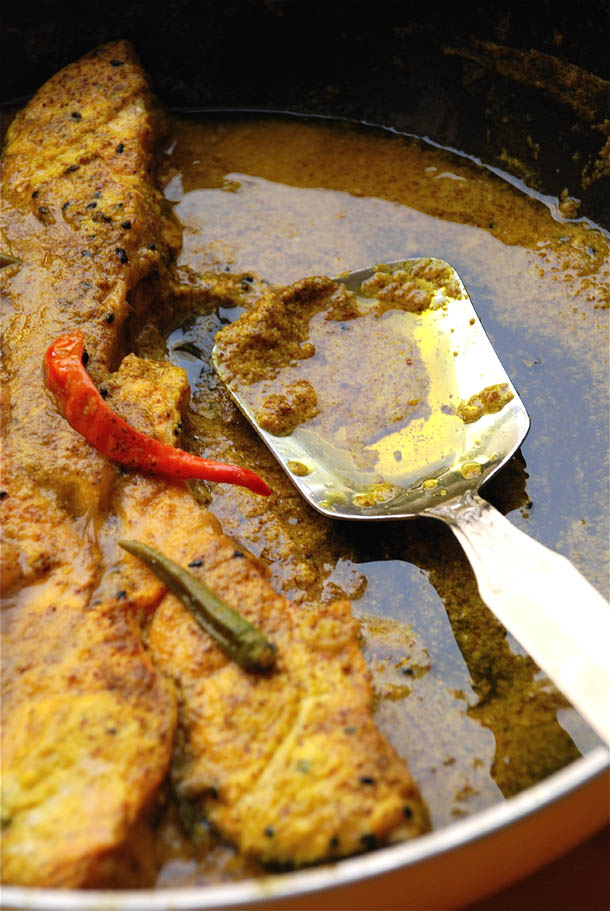
Probably every Bong is born into this world expected how to cook Shorshe Bata or how to categorise a dish cooked in Shorshe Bata as oshadharaon/fabulous or joghyono/horrible. Taking cue from a Bengali phrase, this post is not about Mayer kaache Maashir golpo bola (which loosely will translate into… saying things to a person that are already known to him!). What I mean to say is that… this is what I do when I cook Shorshe Bata for our non-Bengali friends or non-Indian friends. The taste is traditionally Bengali, the cooking technique mostly not. And most of the times, the fish too is not what a traditional preparation would typically expect – Rui or Katla. My freezer doesn’t regularly stock Bengali fish – the frozen Bengali fish bought from the Bangladeshi markets, until and unless our parents are visiting us. Or, some fussy relative visits us from back home who cannot digest his/her meal without a Bengali fish and that too cooked in a typical Bengali jhol or jhal (below)!
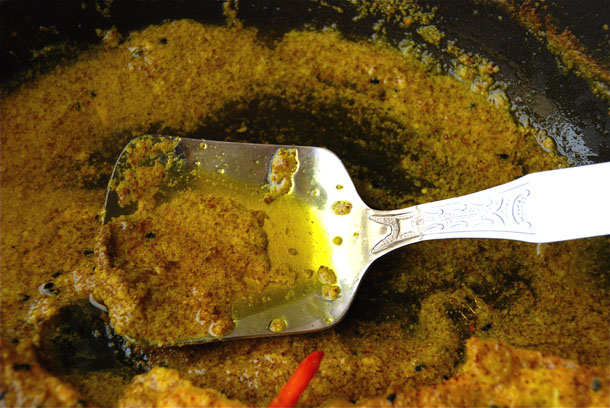
One of the things that cannot be substituted is naturally, Shorsher Tel or the Mustard Oil. The gravy (above) that gathers once cooked in Mustard Oil is, then Bong certified! Getting the right Mustard Oil can be sometimes tricky on foreign shores. The Asian supermarkets do stock different types of Mustard Oil. Here in Dubai, even regular supermarkets like Spinneys, Choitram’s, Carrefour or Lulu Hypermarkets stock Mustard Oil but a few of the brands are taste very bland and flat. A small study into Mustard Oil {here...} probably will help in choosing the right Mustard Oil. It has to be really pungent, must be very deep in colour and have a strong Mustard smell. I have been using a brand that is called PRO (probably there are more brands around, but this is readily available. I remember using another brand called Tez while we were in Frankfurt. I’ve found it in Dubai too, but which currently is unavailable). Do look out for this term ‘Kachi Ghani‘ where the term refers to cold press extraction process of Mustard Oil so that it may retain more oxidants and vitamins.
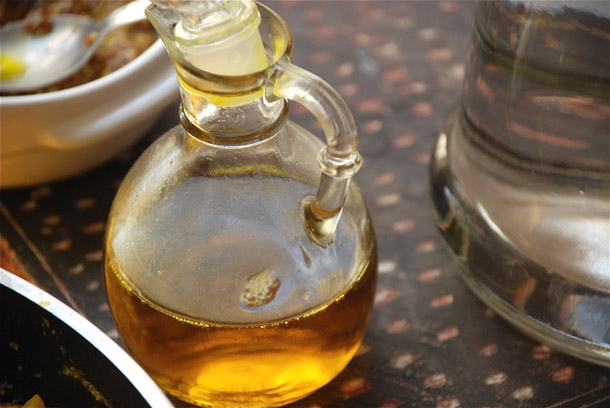
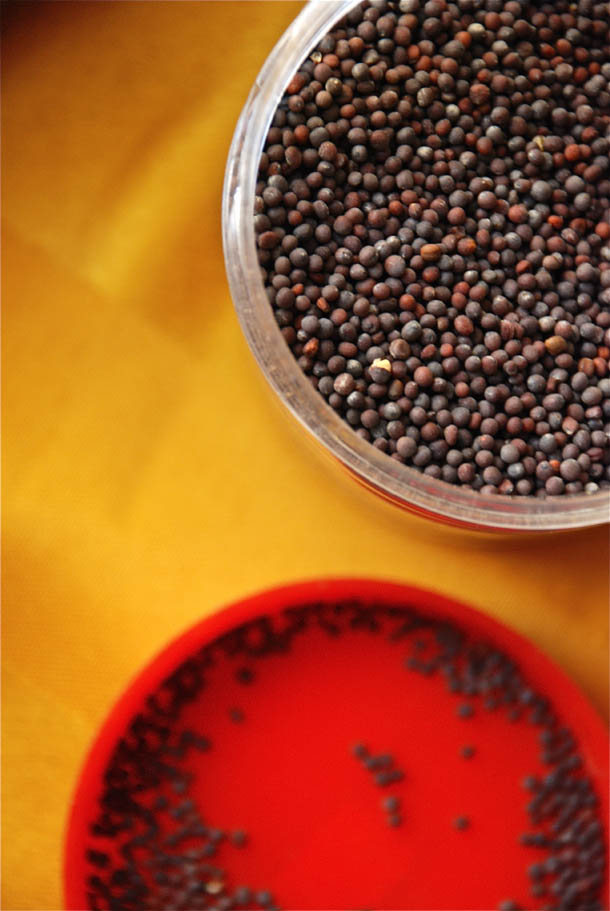
The second most important ingredient is Mustard Paste. Traditionally, Mustard Paste is made by grinding the brown Mustard Seeds (above) on a Sheel Nora, the traditional grinding stone used in Bengali kitchens but a look at my etched Sheel (below) will probably tell you that I’ve figured out other ways to get my Mustard Paste done! A modern day Coffee grinder works just as fine though my Mum and Mum-in-law wouldn’t agree to that. And if this is also a bit too much of a chore, I’ve experimented with a whole lot of bottled Mustard Pastes available in the supermarkets and have found my soul mate – the Mailler’s Moutarde D’Ancienne Mustard Paste (down below). You may probably stumble upon your own version but definitely do use a Mustard Paste which has these visible seeds in them and is not a smooth paste – in order to give the authentic Bong Shorshe Bata feeling. I’ve been also fine-tuning the Aloo Bhaate or the simple Mashed Potato with this Mustard paste {Mashed Potato Bengali Style/ Aloo Bhaaté} to make a gourmet presentation for my German friends who die for Kartoffel Purée!
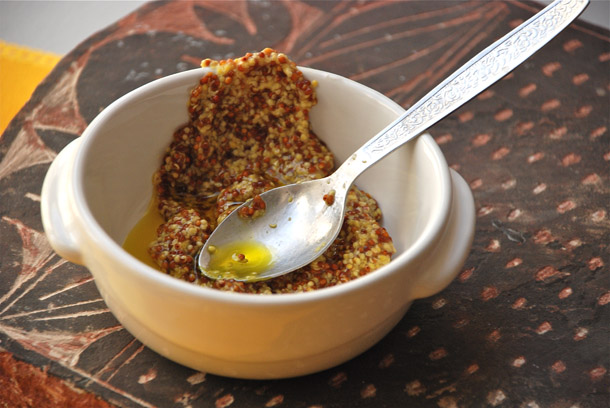
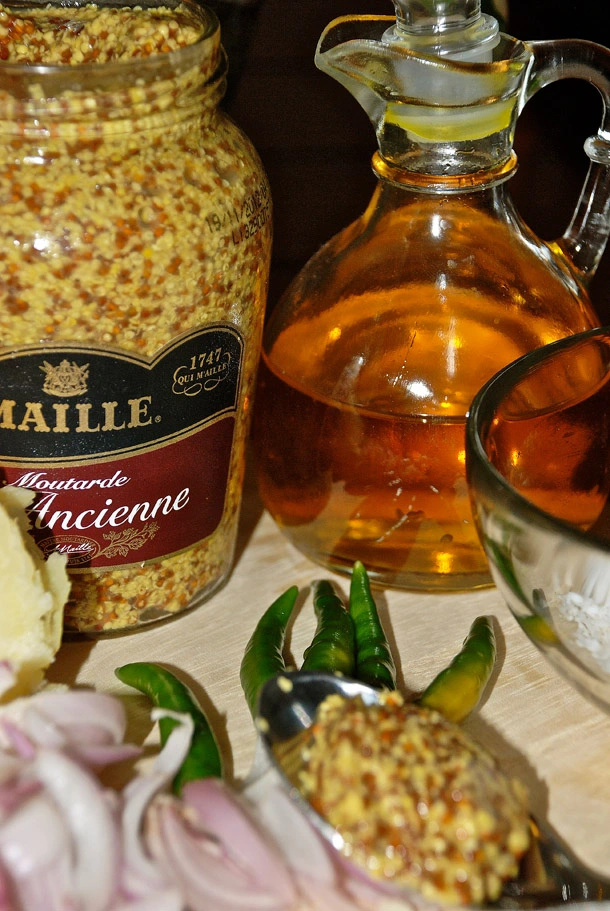
Shorshe Baata Maach/Mustard Salmon
Category – Main Course; Cuisine type – Traditional Bengali
Ingredients
4 pieces big Salmon steaks, longitudinally cut into halves
2 tbsp mustard paste (brand – I use Mailler’s Moutarde D’Ancienne. Use less if you don’t like the pungent mustard paste but as I’ve mentioned before, definitely use a Mustard Paste which has these seeds and is not a smooth paste)
1 tsp turmeric
1 tsp red chilli powder
1/2 tsp black cumin seeds
1 tsp cumin powder – 1 tsp (my Mum-in-law’s secret tip, specially so if your are grinding mustard seeds to make a paste. this prevents the paste from tasting bitter)
3 tbsp mustard oil
1/2 cup grated coconut (optional)
4 pieces green chilies (slit them if you want them more spicy)
salt, as per taste
* If you make the mustard paste by grinding mustard seeds, the proportions are –
2 tbsp brown mustard seeds, grinded into a paste
Method
- Marinate the Salmon steaks with turmeric and mustard paste for half an hour.
- Pour 1 tsp of mustard oil in a wok, add black cumin seeds and let them splutter. Put them aside.
- In a large pan, put the marinated Salmon steaks. Add salt, red chilli Powder and 1/2 cup of water. Pour over the rest of the mustard oil. Cover the pan and let the fish cook in low seam (Make sure that the fish doesn’t stick to the pan when the gravy thickens and the fish gets cooked. You may have to add a bit of water depending upon how you like your gravy to be).
- Salmon has a lot of oil of it’s own and you’ll notice that a lot of oil releases eventually as the fish is slow cooked.
- Add the sliced green chillies, grated coconut and black cumin seeds.
- Let it cook for a while. Serve hot with white rice.
Some prefer their fish to be fried slightly. Whisked yogurt is also added to thicken the gravy. But we prefer it without the Yogurt as it tends to make the taste of the gravy go slightly sour. Also, I do not use grated coconut so that the preparation is light on Z-Sisters’ tummies. Although we like the gravy of our Shorshe Bata Maach to be a bit thick – what I’d describe as makha makha, I try to get the same by slow cooking cooking as much as possible so that the Masalas get cooked in the fish’s own oil and it separates out and floats dreamily on top!
Different takes on Mustard Fish
I sometimes grill the fish marinated with the same ingredients after wrapping the pieces in Banana leaf like a Paturi (above) or add more water to make a patla Jhal/light gravy (below) depending upon our mood! Shown below is Nile Perch cooked in the Bengali Mustard style, while the above shows Hummour fillets. We’ve stopped using Hammour completely as they are being ‘over-fished’. in the UAE waters.
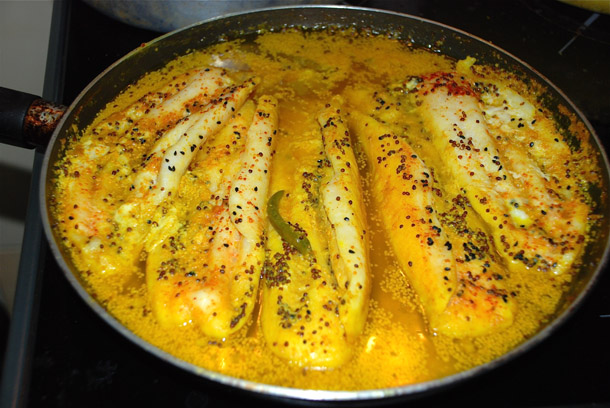
Taking the fishy excerpt out of the Encyclopaedia that I’ve written on Traditional Bengali Cuisine:
Fish is still cooked daily for main course in most traditional Bengali households. Bengali cuisine is famous for it’s Maacher Jhol or Maacher Jhaal. Maacher Jhol is where the gravy of the dish is made with ginger, turmeric, cumin powder, green chillis (the ingredients may vary from one region of Bengal to another) and Jhaal is where the gravy is hot and spicy and made with mustard paste, turmeric, chilli. Shorshe Maach/Mustard Fish is a very popular fish dish.
Shown below are various Bengali fish delicacies (starting from top left) – Chitol Maacher Muitha/Chitol Fish Dumpling Curry, Pabda Maacher Jhaal/Pabda Fish Spicy Curry, Tel Koi/Koi Fish in Oil, Rui Maacher Kalia/Rohu Fish Kalia. There are obviously many many more types of fish preparation – Doi Maach/Fish cooked in yoghurt, Bhapa Maach/Steamed Fish, Maacher Paturi/Fish marinated in different spices and wrapped in Banana leaves and then steamed.
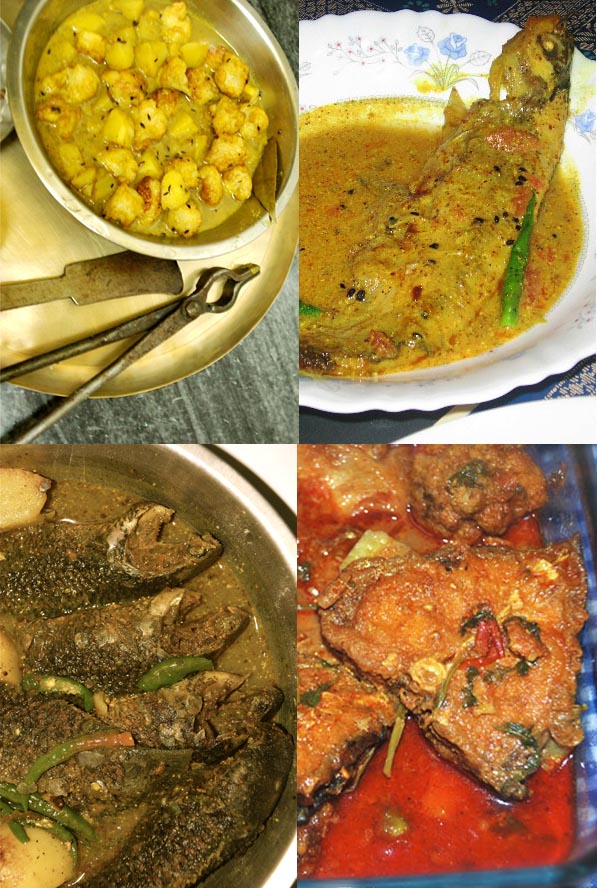
Special mention has to be made to the Hilsa fish. The Hilsa or the Iilish Maach is synonymous with Bengal and is considered the ‘queen’ of all Bengali fish. Hilsa is also of political importance. It is a serious bone of contention between India and it’s neighbouring country Bangladesh. Which Hilsa is better – the Hilsa that is found in the Padma river in Bangladesh or the Ganga river, the last phase of which flows through Bengal before it merges into the sea-waters of Bay of Bengal?
The entire month of July and August, that is during the Monsoons, Kolkata is gripped by Hilsa fever. Hilsa festivals and special Hilsa lunches are organised in different clubs and hotels. Each conversation revolves around Hilsa. This year had been hard-hitting for the Hilsas with the prices shooting upto as high as Rs 1,500/kg (Dhs 100/- approximately!). The fish markets in Kolkata are in itself a subject for immense discussion – perhaps better kept for another future post. The bony Hilsa is a delicacy and is prepared traditionally in many ways – the Shorshe Baata/Mustard Hilsa, Kalo Jeerar Jhol/Black Cumin Curry, Bhapa/Steamed etc.
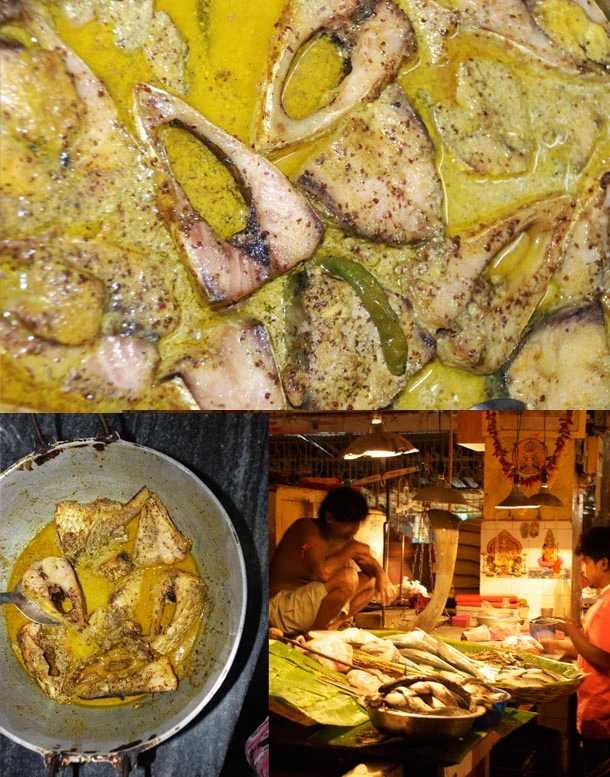
The discussion of Bengali fish can go on for ever. To cut it short we bring in the topic of Prawns. Bagda Chingri/Tiger Prawns and Golda Chingri/Indian Scampi go into making exquisite Bengali delicacies – Shorshe Chingri/Mustard Prawn (below right), Prawn Polao (below left), Narkel Chingri/Coconut Prawn and the famous Chingri Maacher Malaicurry/Prawn Curry where Coconut milk is used to make the gravy and is made on very special occasions.
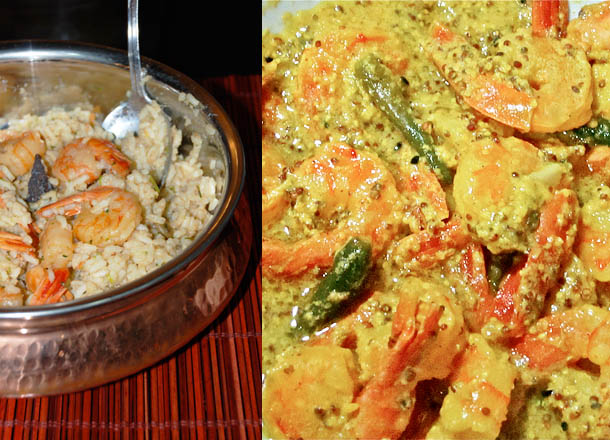
Where will you get Bengali Fish in Dubai?
Many of us who have now made our homes on the shores beyond Bengal, have substituted various things to complement our Bengali Cooking. We have adapted ourselves and learnt to make good of what is available in the local markets. Most of the Bengali friends of my generation grew up studying for exams and not entering the kitchen that much. We ate what we were served by our Mums. It’s only when we began living our own lives that we started resorting to Bengali Food as our fall back comfort food. Binging on traditional Bengali meals when visiting our parents’ homes on holidays and waiting for someone more experienced in Bengali cooking – were the only ways to experience the meals that we grew up on.
Where will you get Bengali Fish? Most Bangladeshi markets stock frozen packets of the different fish that are used in Bengali cooking. So you’ll get Koi Fish frozen fresh, packed in Thailand and flown many miles to Bangladeshi markets world wide. While we didn’t find any Bangladeshi market in Colombo, Srilanka, our stay in Frankfurt wasn’t devoid of Bengali Fish! Our stint in Colombo, Frankfurt and Dubai has taught us that if one is looking for Bengali food products that are available outside India, they can only be found in Bangladeshi shops and Asian supermarkets selling Bangladeshi products.
In Dubai, a few Bengali fish is available in the supermarket Citi Mart near Imperial Suites Hotel, located on Rolla Road, Bur Dubai (Tel: 04-3523939). It’s quite likely that on Friday mornings you’ll bump into Bengalis who have come to do their fish-marketing. All varieties of Bengali Fish are available at the Bangladeshi markets in Backet in Sharjah. Rui Maach/Rohu fish is available at Lulu Supermarket in Al Barsha but the sizes of the fish being smaller than 1.5 kgs results in a bit if disappointment in taste.
The different fish that are available in the local supermarkets in Dubai that I often use to make traditional Bengali fish preparations… Lady fish fried in batter substitutes well as Topshe Maach Bhaja, Sultan Ibrahami cooked with Black Cumin Seeds substitutes well as Pabda Maacher Jhol, Cream Dori fillets wrapped in Banana Leaves substitutes well as Bhetki Maacher Paturi. Salmon steaks cooked in Mustard Paste and Mustard Oil substitutes, well sorry there can be no substitutes for this – the Hilsa! But it works quite well. Almost! Red Mullets can be cooked like Bhetki Maach and Needle fish can be fried crispy like Mourala Maach.
I’ve gathered the following Mustard fish recipes from my blogger friends (they are food bloggers first and then Bongs!). Some recipes use traditional Bengali fish, some don’t – as my friends too have learnt to cook with substitutes while living on foreign shores.
- Bhapa Shorshe Chingri: Steamed Prawns in Mustard, Poppy Seed Sauce from eCurry
- Shorshe Maach / Tilapia in Mustard Sauce – Guest Post for Vijitha @ Spices N Aroma from Sunshine and Smile
- Flounder in a Bengali Mustard Curry – Shorshe Flounder from Cooking in Westchester
- Macher Paturi/Parcels of mustard-coated fish steamed in banana leaves for a perfect evening from Quick Indian Cooking
- Bhapa Ilish — Steamed Hilsa from Bong Mom’s Cookbook
- Bata Mach Sarse Diye – Fish in Rich Mustard Gravy from Cook like a Bong
- Pomfret Shorsher Jhol or Pomfret in Mustard Curry from Finely Chopped
- Choto Maacher Jhaal from The Bengali Gourmet’s Blog
Food connects people, cultures, countries and minds. I cooked this dish for Dima, a food artisan herself. She came back from her culinary trip from Mauritius and told me that there’s a traditional Mauritian dish – the Vindaye, which is very similar to the Shorshe Bata Maach that I had cooked for her. Here’s her recipe to the Calamari & Shrimp Vindaye – Mauritius Specialty Mustard Curry.
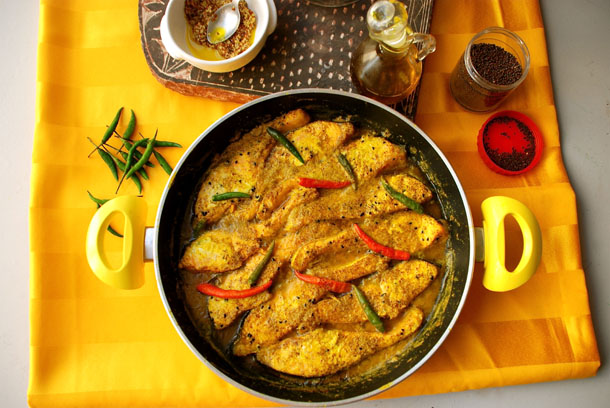
With this post I am a satisfied Bong soul, even though I had written so many Bengali posts previously, including my encyclopedic post on traditional Bengali cooking {Traditional Bengali Cuisine | In ‘Slight’ Details}. Shubho Noborsho to all my readers and here’s explaining the Bengali Mustard fish or the quintessentially Bengali preparation Shorshe Baata Maach for those not acquainted to Bengali cooking – this may not be the traditional Shorshe Bata Maach but it definitely has the same traditional taste, values and emotions!
Unblogging it all… Ishita
Disclaimer: This isn’t a sponsored post, nor are there any affiliated links. The subject, story, opinions and views stated here are my own. While you enjoy reading my posts with lot of visuals, please do not use any material from these posts. Do join me on my daily food and travel journey on Instagram, Facebook, Twitter and Pinterest.

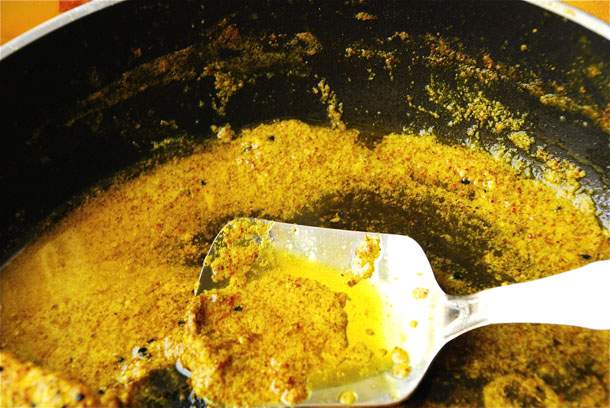
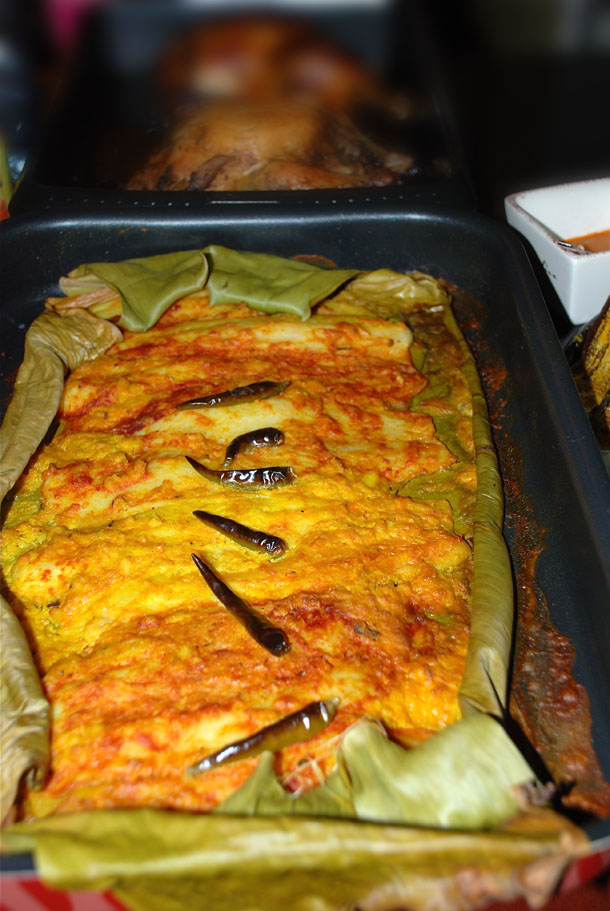

Ah, it felt satisfying just reading this! We don’t have many Bong restaurants here, and the only decent Bong curries I have tasted – excluding the divine meals at armed forces friends in Wellington, Nilgiris decades ago – is in O Calcutta in Bangalore. A trip to Dubai certainly seems more and more tempting 🙂
LikeLike
‘Am loving the comments for this post – somewhere I must have connected big time with your fishy souls!’ Absolutely, just come… you’ll get enough subject for your lenses. Love to see you back:)
LikeLike
Oh yes you did 😀
Ishita, i bought several varieties of Maille’s mustard from the original shop in Paris years ago and was very disappointed. Found them all less pungent than Coleman’s for example. Isn’t there an Indian version that will work, like bottled Kasundhi mustard that i can use?
LikeLike
Really? I’ve given the picture of the Maille that I use. Have you used that? This is really strong with big seeds in them. Funnily I find the Coleman too light. Kasundhi is a bit picklish, might make the taste a bit too sour. Why don’t we resort to original Mustard Seeds in a coffee grinder?
LikeLike
Sounds good 🙂
LikeLike
Ishita are in UAE?? Its amazing how u prepared this recipe … I tried making it tonight … exactly the same way and same steps as had been mentioned by you .. and the result is quite AweSoME .. MAA’er kotha monaay poraay gelo … I live in uae too .. in Al Ain … plz contact me at +971527509529 .. or send me ur no… please please please
LikeLike
Thank you, I am sure I will be old enough to be your mum!!!
LikeLike
Wow. I think you would get along very well with my dad who is very much fish crazy. Every Friday he travels to the fish market in Deira to get fresh fish in bulk. I would love to make a similar version of your Shorshe Bata Maach for him. Where can I find the mustard paste you recommended (Mailler’s Moutarde D’Ancienne) ?
LikeLike
‘Am loving the comments for this post – somewhere I must have connected big time with your fishy souls!’ Thank you Insiya… then you must try this for your dad for sure. Mailler’s Moutarde D’Ancienne is available in all the sauce sections… I get mine from Lulu’s – you know where you get a whole lot of bottled Salad dressings?
LikeLike
I eoukd very love to open
up a bangali restaurant
in uae … I have even thought of a name and It goes as such ” Delicacies of Bengal” or “Spicy Kolkata”
LikeLike
All the very best, do let me know when you do open one!
LikeLike
Some great photos and recipes here… And Humor! I love it. Love too, that though these are very traditional recipes, I don’t necessarily have to grind my own mustard seed. I can work with some Maille for sure and definitely plenty of salmon in these parts. I’d still have to do a little tweaking with ingredients but am inspired by these dishes. I can get banana leaves I think:-) cheers… wendy
LikeLike
‘Am loving the comments for this post – somewhere I must have connected big time with your fishy souls!’ You are an my blogger in crime since the time I started… so you know the evolution of my blog… such genuine feedback like this (with great perspective) is so so heartwarming. You should go for it – bananas and grated coconut, slice the green chillies!
LikeLike
Shubo Noboborsho to you and yours:) Being married to a bengali the biggest perk has been mum in law feeding me awesome bengali food…fish cooked in mustard one of them and i absolutely love it..each yr when we visit them is like a treat for me and fish is all i eat…any attempts of them to coax me to eating anything else fails…aah…kosha mangsho …yes that too please…
LikeLike
‘Am loving the comments for this post – somewhere I must have connected big time with your fishy souls!’ Oh what a surprise! I didn’t realise Prachi that you would in any way (even minutely) aware of Bengali food… coz not many Bongs in Fooderati there. Hence my attempt to bring forward some Bong dishes to other nationalities. As long as the taste is tempered, do you really care what’s the method of cooking? Kosha mangsho – wow! With Luchi? My Luchi with Kasha Mangsho got featured in Ahlan! Gourmet… can provide the link here – but the post is on Luchi. Kasha Mangsho recipe’s in the magazine. Care? https://ishitaunblogged.com/2013/02/18/luchi-featured-in-ahlan-gourmet-my-ode-to-phulko-luchi/
LikeLike
But then there’s a Kasha Mangsho with red Wine on my blog… double care? Objective – Bengalize the world in a subtle way, under the wraps of Wine or anything fancy!
https://ishitaunblogged.com/2012/10/04/mutton-kassa-with-red-wine-and-red-grapes/
LikeLike
well that makes two of us then:) totally with luchi…liketoday when its drizzling!
enjoying going through all of your earlier posts…its a goldmine here:)
LikeLike
Two is good company for sure. Flattered with the compliment, love gold:)
LikeLike
Finally, you come up with something on the vegetarian side 😉 I absolutely adore fish. After reading through the recipe, it seems we people follow the same procedure ( and I am not a Bong ). Mustard paste and all… Looks yummy and would taste even better, am sure 🙂
PS- the Thailand series seems to be coming good so far 🙂 Waiting for more posts
LikeLike
‘Am loving the comments for this post – somewhere I must have connected big time with your fishy souls!’ Now I’ve slightly been anxious for your comments. Thought that if my post is on a ‘vegetable’ that you call Fish, you might be hopping in!
And thanks for your feedback on the Thailand series… many more to come for sure. One helluva inspirational journey (for my tummy, that is)!
LikeLike
Ishita, your posts are always a joy to read, just like chatting with you in person. Full of light and laughter and great information. Every time I stop by, I am delighted to learn not only how to make a tasty dish, but I get a lesson in Bengali culture, language and food. I will definitely be trying this one!
LikeLike
‘Am loving the comments for this post – somewhere I must have connected big time with your fishy souls!’ Stacy, I’m so so so touched reading your comment. You know what, when I start my blog journey, I do want to write about our culture without overwhelming others. Plus the fact that it’s reaching to all people (which is my objective – not just Bengalis or Indians or Asians!) and you ‘probably’ get to see what I see… I feel BLISS! Love to hear from you always.
BTW, did you just describe yourself in the first line and referred to me by mistake?
LikeLike
Ha, you are very funny – and sweet! I meant every word just for YOU!
LikeLike
Promise me an all bengali dinner invite when I’m in Dubai. Thanks!
LikeLike
My pleasure! You just let me know in advance… if you are okay with Salmons and the Mackerels of the world, then you can just give me a quick buzz. But if you want the Hilsas and Rohus and other Bong fish, then got to make a trip to Sharjah Fish market.
You drop me a line, genuinely!
LikeLike
Hi Ishita,’
Esha Nag told me about your blog. the moment i read this post I sent my cook to City mart and had shorshey ilish to my hearts content. BURP!! Good thing about Dubai we get good hilsa here most of the year. Nice post. Following you.
Cheers
Amrita
LikeLike
Hi Amrita! Oh No, did I make you spend money immediately? Subscribe my blog for Free and then run to the stores!!! Glad to see you here. Hopped onto yours as well – would be lovely to read posts with a non-food perspective on Dubai (though don’t mind the food perspective too!). Love to Esha:)
LikeLike
Ok now I have to say, when I tried this dish I thought what strange combination, however in favour. I loved it and you did a fabulous job with those salmons. I so want more, so am definitely giving this recipe a go :)) It is DIVINE!
LikeLike
Thank you Dima! Actually had I not made it for you that day, this post may have been buried forever. You were talking of a Mauritian fish curry, cooked in the similar way. Looking forward to reading that:)
LikeLike
followed your instructions and made fantastic sarse bata ilish mach
LikeLike
I’m so happy that it turned out to be ‘fantastic’. Did you use the French Mustard or did you grind it? No photo to share with the other readers? Do post them here…. https://www.facebook.com/ishitaunblogged
LikeLike
Hi,
I came across your blog via Google, while looking for “Sorshe Bata Maacher Jhol”.
I loved the detail and am going to try it out soon.
As for People in Dubai, after a long search, i did find a Bengali Restaurant, called Food Village, near NMC hospital in Al Qusais. They Cook Sorshe ilish on Thursday and Friday.
you can find a lot of other Bengali (Bangladeshi) food and sweets there. the ambiance is good.
LikeLike
Thank you Shashank! Did you try out the Bengali Restaurant? Is this nice? I have to visit this place as soon as I can. Hope to see you around in my blog. And thanks for the brilliant info:)
LikeLike
Pingback: Kolkata Biryani | Cooking The Royal Dish In Lafayette Gourmet And A Tweaked Recipe! |
Pingback: Blog Turns 2 | A Chance To Meet Masterchef Sanjeev Kapoor For 2 Lucky Readers! |
Pingback: Kumro Bhaaté or Mashed Pumpkin Bengali Style And I Ask What The Heck Was Halloween? |
Ishita loved your blog and shorshe Salmon recipe! Romola
LikeLike
Thank you Romola and welcome to my blog:)
LikeLike
Pingback: Experiential Dining Along The Dubai Creek | Bateaux Dubai |
Pingback: Opening Up My Bengali Kitchen For Dima Sharif | #RamadanSpecial2014 |
hey ishita , wat a descriptive blog you have on bong cuisine . I live in frankfurt and seriously miss the Indian fish ! The only ones i can lay my hands on is river trout ! n then the rest are alaskan sea lachs which i didnt dare to try 😛 ! frankfurt mei where did u used to catch ?
and keep blogging ! 🙂
LikeLike
Thank you Sagar… we used to get Hilsa and other Indian fish from the Bangladeshi/Indian store near the Frankfurt am Main station. We have tried frozen Alaskan sea lachs too… give it a try – you have nothing to lose… if it turns out bad, smash it and make it into chops!!!
LikeLike
Just chanced upon your blog and you have made me salivate. Miss my bong food!
LikeLike
Well my mission is accomplished… thanks you for hopping in!!!
LikeLike
Pingback: Bhapa Mishti Doi and A Food Safari of Bengal in BBC GoodFood Middle East | Shubho Bijoya & Eid Mubarak! |
Pingback: Kebab Bistro | A Parsi Lunch Buffet To Remember |
Pingback: Thailand Salmon | Thai-Iceland
Pingback: Abhijaan 2015 – Bengali Film Festival In Dubai | Teenkahon – Three Obsessions | IshitaUnblogged
Pingback: Abhijaan 2015 – Bengali Film Festival In Dubai | Manoj Michigan’s 89 | IshitaUnblogged
Pingback: Abhijaan 2015 – Bengali Film Festival In Dubai | Arindam Sil’s Ebar Shobor | IshitaUnblogged
Pingback: Abhijaan 2015 – Bengali Film Festival In Dubai | Anindyo Ghosh’s Bharaate | IshitaUnblogged
Pingback: Abhijaan 2015 – Bengali Film Festival In Dubai | Atanu Ghosh’s ‘Ek Phali Rodh’ | IshitaUnblogged
Pingback: Pudding of Love | Mum-In-Law’s Special Caramel Custard | IshitaUnblogged
I liked the design of your blog entry! I am already halfway through making the fish, so I cannot amend the recipe, but your nice blog did caught my eye.
LikeLike
Wondering if you are reading the blogpost in the middle of your cooking… hope it turned out fine!
LikeLike
Pingback: Where Will You Eat Bengali Food In Kolkata? | From Traditional to Bohemian | IshitaUnblogged
the amount of information that you share… mind blowing. i am going to have to slowly walk thru all the posts you have written. i am sitting here so very, very grateful and excited about being taken to school by someone that really cares about sharing and teaching. cheers~
LikeLike
Thank you for such warm feedback.
LikeLike
Pingback: Food, Love And Good Memories Travelling in My Suitcase! | IshitaUnblogged
Wow! A great tribute to shorshe bataa maach. So much detail about the importance of fish in a bengali’s life. I m a fish lover too but never tried bengali fish. Your post has given me the motivation to go for it. This weekend it’s going to be one these fish recipes on our dinner table. 😃
LikeLike
Thank you Khushbu. Let me know what you think of the dish. xx Ishita
LikeLike
Pingback: A-Z of Bengali Fish
Pingback: Shubho Noboborsho | A traditional Bengali menu for Frying Pan Diaries podcast
Pingback: Traditional Bengali Cuisine | All The ‘Slight’ Details